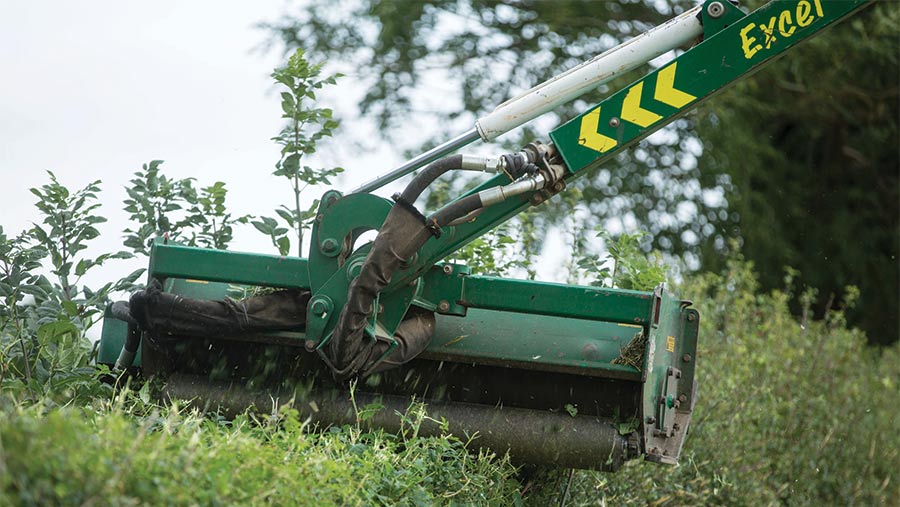15 fresh ideas for making money or cutting costs on farm
 © Dmitry/Adobe Stock
© Dmitry/Adobe Stock Higher working capital requirements will put a squeeze on cashflow for many farming businesses this year, so finding ways to generate new income streams or save time and money could be crucial.
Looking at different aspects of a farming business can present opportunities to make marginal gains which can add up to bigger savings.
Farmers Weekly asked three farm business consultants for ideas on some more unusual ways to make extra money, improve business efficiency and raise finance.
See also: Read more business finance advice from Farmers Weekly
Meet the experts
- Paul Waberski Head of agri-business consultancy, based in the Leicester office of Brown & Co
- William Tongue Partner and farm business consultant, based in the Kettering office of Berrys
- Simon Haley Director and rural business adviser, at north-west-based SRH Agribusiness
1. Check mobile phone and internet contracts
Letting phone contracts drift on without reviewing them can be an expensive mistake. We were doing a budget for a farmer and were surprised to find the mobile phone bill was £7,000 a year.
Some digging revealed the business was paying for eight handsets, one of which had not worked for years. The farm was also still picking up the tab for their adult children who were not involved in the business.
Paul Waberski, Brown & Co

© Hero Images Inc/Alamy Stock Photo
2. Rent a room
Renting out a spare room is a good way of making some additional income to cover rises in living expenses and can offer some company.
We know of a couple of farmers who have rented out rooms to graduates on Spareroom.com because the house felt too quiet after their children left home.
If you live within 10 miles of a university, there may be potential to let out a room to a student from a farming background who prefers to live on a farm, rather than in a traditional house share.
The government’s Rent a Room Scheme lets you earn up to a threshold of £7,500 a year tax-free from letting out furnished accommodation in your home.
Paul Waberski, Brown & Co
3. Temporary lets
Letting out buildings is a popular form of diversification, but it doesn’t necessarily need to be on an all-year-round basis.
Consider whether there are any alternative uses for farm buildings at different times of year to help generate a new income stream.
For example, one client rents out their grain store, once their own grain has been sold, to a business selling firewood and woodchip and uses it to dry out the wood.
Paul Waberski, Brown & Co

© Tim Scrivener
4. Sell off spare machinery
Most farmers will have surplus machinery that they are holding onto in case they need it. With demand booming for second-hand kit over recent years, it may be more sensible to sell it on.
Hauling machines to a collective sale can take time and cost, so consider a national online sale which allows farmers to sell odd bits of kit.
Paul Waberski, Brown & Co
5. Pension scheme options
In 2015, the government introduced changes that give greater flexibility to how a pension pot can be used. It is now possible to draw down a proportion of a pension to invest in commercial property.
This means farmers can be more inventive about how they use their retirement money and generate a new income stream.
Paul Waberski, Brown & Co
6. Review farm vehicle usage
Ask yourself whether you really need the 22mpg 4×4 parked in the yard for that trip to collect parts and go shooting, or would a cheap runabout suffice?
Shift half the annual mileage to a vehicle doing twice the mpg, which costs half as much to service and a third less in tyres – plus saving mileage-related depreciation on a high-value vehicle – and you could save more than £1,500 a year.
William Tongue, Berrys
7. Get to grips with energy consumption
Monitor electricity meters to understand daily consumption and use metering plug sockets or sub meters to find out the main contributors.
Consider improvements to efficiency, reduction in usage and ways to bill consumption more effectively to tenants.
Install renewables where there is a good match between consumption and production (and maybe improve the match with battery storage).
William Tongue, Berrys
8. Beware the machinery treadmill
On many farms, the automatic response to high tax bills is advanced machinery investments.
This results in high depreciation, removal of cash from the business (£1 spent may save 40p in tax, but still sees 60p removed), and it fuels a treadmill of 100% writing down allowances which encourages the same behaviour to repeat.
Reinvest where the result gives efficiency gains and system changes, rather than simply new for old – so say “yes” to solar panels, grain bins, reduced depth cultivators, and “no” to newer versions of existing tech.
William Tongue, Berrys
9. High-return diversifications
All too often the cash return from a new project is swallowed in tax and loan repayments. For example, a project funded over 10 years at current interest rates will need a 20% return on capital just to break even in cashflow terms.
Few projects offer high returns without substantial risk. Building rentals, container storage and dog exercise paddocks all work numerically, although will be very location specific.
So, the most effective form of diversification might be the hardest to accept – identifying who really needs to be hands-on in the business and who could bring in cash or become self-supporting through a job off-farm could be the most significant way to generate cash, particularly for tenants.
If succession to an Agricultural Holdings Act tenancy is a prospect, be careful not to jeopardise the successor’s case through them earning too much away from the tenanted holding.
William Tongue, Berrys

© Lindsay Helms/Adobe Stock
10. Adopt lean thinking
Lean thinking is a business approach which involves focusing on what delivers most value. So, the idea is you spend on processes and inputs that contribute to output, but hold back on incurring costs which don’t.
Examples could include holding back on annual hedgecutting, except where needed for safety reasons, and repeated mowing of unfarmed grass areas.
William Tongue, Berrys

© Tim Scrivener
11. Take advantage of free advice
Farmers can access free advice and business support worth up to £2,000 a farm, by signing up to the Future Farming Resilience Fund.
It is designed to help farmers understand the changes they are facing and how they can adapt their business models.
There are 17 providers funded by Defra to give this consultancy support. However, the package each provider delivers is different – for example, group workshops, online webinars, or on-farm one-to-one support.
So before signing up to any one company, investigate what support you will be getting and whether you gel with the person you will be working with.
Simon Haley, SRH Agribusiness
12. Time and task management tools
Trello is a free project management tool where you can set up lists to help record what needs to be done and plan which jobs need to be prioritised.
It’s a bit like a virtual whiteboard, which is accessed from a smartphone and syncs with a desktop and laptop.
It’s useful for planning time effectively and provides a central list that can be shared with family members and employees.
They can add their own comments, so everyone knows what has been actioned and what is still to do.
It might take a little getting used to, but effective communication saves time and, ultimately, money.
Simon Haley, SRH Agribusiness
13. Henry Plumb Foundation
If you are 18-35 and have a fresh business idea, then the Henry Plumb Foundation may offer financial support.
It provides funding of £500-£3,000 which can be used to pump-prime a new enterprise, or the money can be used to pay for study plans that will further your career in farming or the food industry.
The scheme also offers successful applicants access to a mentor for three years.
Investigate whether there may be other bursaries and scholarships available from colleges, universities, agricultural businesses and local show societies to fund travel plans or new start-up enterprises.
Simon Haley, SRH Agribusiness
14. Sign up for e-alerts
Sign up for email alerts which will keep you ahead of the game, particularly when it comes to information about grant schemes and new policy.
For example, it is possible to subscribe to email alerts every time the Rural Payments Agency (RPA) makes a change to any of its grant schemes which can be sent to you weekly.
Visit the RPA page on gov.uk and look for the “Get emails” link.
Simon Haley, SRH Agribusiness

© Bits and Splits/Adobe Stock
15. Alternative finance options
For those struggling to raise finance from a high-street bank, alternatives such as Community Development Finance Institutions may be worth exploring.
These are locally based, not-for-profit social organisations which can provide finance where customers might not fit the banks’ usual lending criteria.
One such organisation is Enterprise Answers, based in Cumbria, which offers finance from £10,000-£150,000 for business needs such as working capital, growth, equipment and premises.
